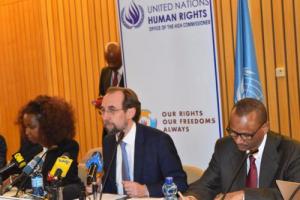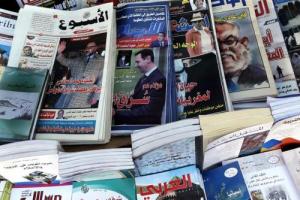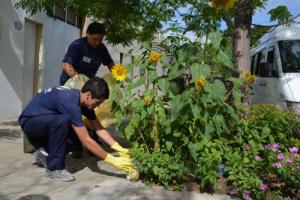Human Rights
In Ethiopia, UN rights chief urges authorities for greater freedoms; space for critical voices

High Commissioner for Human Rights Zeid Ra’ad Al Hussein (centre) addresses a press conference in Addis Ababa, the capital of Ethiopia.
- Read more
- 337 reads
Morocco: Scrap Prison Terms for Nonviolent Speech

Newsstand in Rabat, Morocco.
- Read more
- 374 reads
Philippines: UN Members Should Denounce Killings, Abuses
United Nations member countries should denounce the Philippines’ brutal “war on drugs” that has killed more than 7,000 people since President Rodrigo Duterte took office in June 2016, Human Rights Watch said on May 03. The Philippines will appear for the third cycle of the Human Rights Council’s Universal Periodic Review (UPR) on May 8, 2017, in Geneva.
- Read more
- 354 reads
Somalia: Rights Priorities for New Government
Somalia’s new government should ensure that the security forces are accountable and improve protection of the most vulnerable people, Human Rights Watch said in a 10-point report on human rights priorities on May 02. The London conference on security sector reform in Somalia, slated for May 11, 2017, is an important opportunity for Somalia’s leadership and the country’s international partners to make a commitment to address past abuses and improve future responses to the many problems arising from war, famine, and political dysfunction.
- Read more
- 388 reads
Thailand: Rights Lawyer Feared ‘Disappeared’
The Thai government should immediately disclose the whereabouts of Prawet Prapanukul, a prominent human rights lawyer and critic of the monarchy, who has been missing since security forces raided his Bangkok home on April 29, 2017, Human Rights Watch said on May 02. Authorities have not acknowledged his arrest and detention, raising grave concerns that he is the victim of an enforced disappearance.
- Read more
- 376 reads
Citing Uruguay’s ‘inspiring’ record on environment, UN expert says country must do more

Mosquito prevention and control in Salto, Uruguay.
- Read more
- 372 reads
India: UN Review Should Condemn Crackdown on Rights
United Nations member countries should call on India to stop targeting nongovernmental organizations (NGOs) and others who criticize the government or its policies, Human Rights Watch said on May 01. The UN Human Rights Council will conduct its third review of India’s human rights record under the Universal Periodic Review (UPR) procedure on May 4, 2017, in Geneva.
- Read more
- 355 reads
Central African Republic: Armed Groups Target Civilians
Armed groups fighting for control of a central province in the Central African Republic have targeted civilians in apparent reprisal killings over the past three months, Human Rights Watch said on May 02. The attacks have left at least 45 people dead and at least 11,000 displaced.
- Read more
- 360 reads
Philippines: Release and Protect “Secret Jail” Detainees
The Philippine government should immediately release the alleged drug suspects unlawfully detained in a Manila police station “secret jail,” and ensure their protection after release, Human Right Watch said on Apr 29. The official Commission on Human Rights (CHR) and the National Bureau of Investigation should conduct a joint investigation into the existence of other unofficial lock-up cells in police stations across the country and ensure they are shut down.
- Read more
- 399 reads
Bahrain: End Degrading Treatment of Activists
Bahraini authorities’ treatment of wrongfully imprisoned detainees violates international standards on prisoner treatment and in some cases may constitute cruel, inhuman, or degrading treatment, a coalition of ten rights groups said on Apr 30. The authorities should ensure that all detainees are treated with humanity and in accordance with the United Nations Standard Minimum Rules for the Treatment of Prisoners, known as the Nelson Mandela Rules, including access to the adequate medical care they require and contact with their relatives.
- Read more
- 371 reads
Human Rights
Fostering a More Humane World: The 28th Eurasian Economic Summi

Conscience, Hope, and Action: Keys to Global Peace and Sustainability

Ringing FOWPAL’s Peace Bell for the World:Nobel Peace Prize Laureates’ Visions and Actions

Protecting the World’s Cultural Diversity for a Sustainable Future

Puppet Show I International Friendship Day 2020

